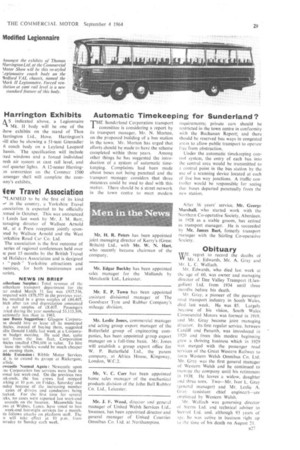Automatic Timekeeping for Sunderland?
Page 31

If you've noticed an error in this article please click here to report it so we can fix it.
THE Sunderland Corporation transport committee is considering a report by its transport manager, Mr. N. Morton, on the proposed building of a bus station in the town. Mr. Morton has urged that efforts should be made to have the scheme completed within three years. Among other things he has suggested the introduction of a system of automatic timekeeping. Complaints had been made about buses not being punctual and the transport manager considers that three measures could be used to deal with this matter. There should be it street network in the town centre to meet modern requirements; private cars should be restricted in the town centre in conformity with the Buchanan Report; and there should be reserved bus ways in congested areas to allow public transport to operate tree from obstruction. Under the automatic timekeeping control system, the entry of each bus into the central area would be transmitted to a control point in the bus station by the use of a scanning device located at each of five bus way junctions. A traffic controller would be responsible for seeing that buses departed punctually from the new station.
After 36 years' service, Mr. George Marshall, who started work with the Northern Co-operative Society, Aberdeen. in 1928 as a stable groom, has retired as transport manager, He is succeeded by Mr. James Burt, fomerly transport manager with the Stirling Co-operative Society.
































































































































